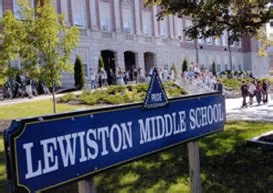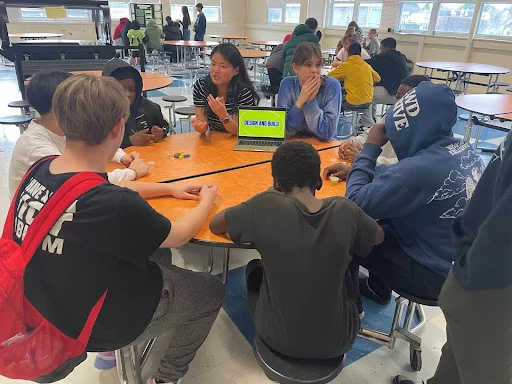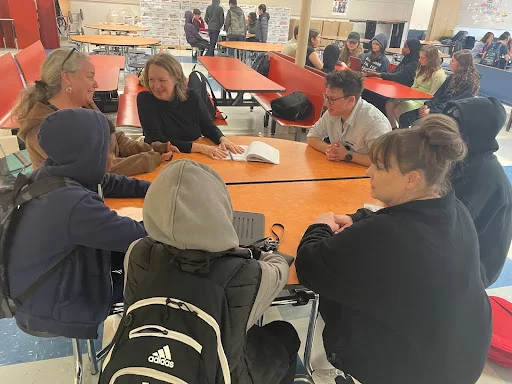Not Too Cool for School
Would the kids at Lewiston Middle School be too distracted or “cool” to engage with the Bates students from Intro to Computer Science who had joined them in the cafeteria for some mutually beneficial community-engaged learning?
As regular readers of the Harward Center blog already know, each fall we host a semester-long Publicly-Engaged Pedagogy program for faculty interested in developing a new community-engaged learning (CEL) course, or infusing CEL into an already existing course. PEP, as we fondly refer to the program, is a favorite Harward Center endeavor because it allows us to work closely with both faculty members and community partners to develop high-quality learning experiences for students at the intersection of theory and practice. In community-engaged learning courses, students are challenged to use what they’re learning in the classroom to help address an off-campus opportunity or need.
This year’s PEP cohort included faculty from six different disciplines, including assistant professor of Digital and Computational Studies Andy Ricci, who dove into CEL with enthusiasm and skill. During the fall semester, Prof. Ricci met each month with the PEP cohort to share a meal together while learning about community engagement ethics and recommended practices. They also met regularly with Harward Center staff member Ellen Alcorn to brainstorm ideas for how to integrate community engagement into the department’s Introduction to Computer Science course. Before long, Andy and Ellen were connecting with a group of teachers from Lewiston Middle School to design a project together that would support student learning on both sides of the street. (Lewiston Middle School is across the street from Bates.) Modeling another best practice for CEL project development, Prof. Ricci visited LMS classrooms to get a feel for the students and the curriculum.
When January rolled around, Prof. Ricci presented the Intro to Computer Science students with their CEL assignment, which was to develop an interactive activity for an end-of semester learning expo at the middle school that explored one of three questions – Why should we care about technology? How do we design new technology to solve problems? How do we tell computers what to do? – questions the Bates students would explore for themselves during the semester and eventually design activities around for the middle school students.
Toward the end of the semester, Prof. Ricci’s class was held not on the Bates campus but in the cafeteria at the middle school. Working in teams of two or three, the Bates students engaged small groups of middle schoolers in hands-on learning about computer science topics like algorithms, internet safety, and coding.
At one popular learning station pictured here, Bates students taught a short lesson about the importance of precise language in computer programming. Then they had the kids work in pairs–with Legos!–to practice such precision. While one member of each pair tried to describe the way that three lego pieces were interconnected, their partner attempted to recreate that configuration without seeing the Lego shape but depending instead on the precise language used to describe it. When time ran out, the two lego structures were compared to each other, and the teammates discussed how building something with language required precision, patience, and teamwork.
While the middle schoolers rotated through the learning stations, their teachers kept careful watch. One admitted that she had been concerned that some of her students might not have the attention span to engage well with the learning activities, or that they might act “too cool for school” around college students. Happily, the teacher’s fears were allayed as her students threw themselves into the various activities and stayed focused at each station.
While the cafeteria hummed with active learning, Prof. Ricci and Ellen circled up with a couple of the middle school teachers and a few of their students to make plans for integrating CEL into more of Andy’s courses. As they talked, a collaborative project for Prof. Ricci’s upcoming May term course, Human-Robot Interaction Design Workshop, began to take shape. With Digital and Computational Studies recently becoming the college’s newest major – one that will feature CEL opportunities throughout the curriculum – Prof. Ricci’ collaboration with the middle school and the Harward Center promises to be a lively one for years to come.


